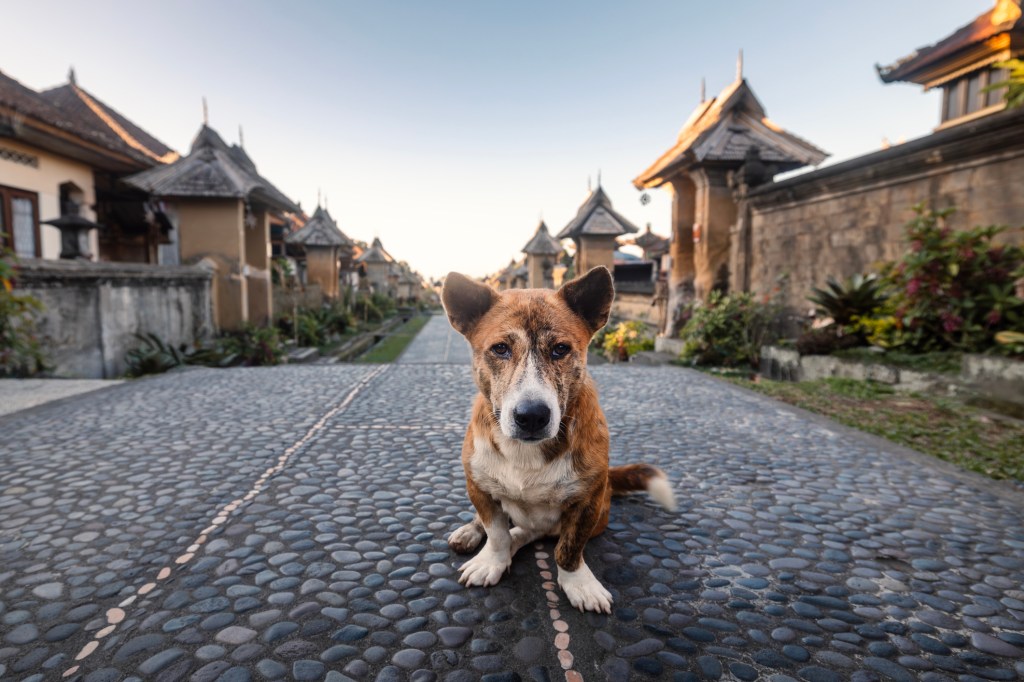The island of Bali, known for its enchanting landscapes and vibrant culture, is witnessing the plight of an integral part of its heritage — the indigenous Bali dogs.
These canines, which have been part of Balinese history for thousands of years, now face the threat of extinction. Culling efforts triggered by rabies outbreaks, combined with unchecked interbreeding, are systematically eroding the population of these unique dogs, pushing them towards oblivion.
Rabies outbreaks and interbreeding resulting in culling of Bali’s indigenous dog population
Mass culling operations in 2008, following the first-ever rabies outbreak on Bali Island, have significantly reduced the population of free-ranging indigenous Bali dogs. Historically, Bali boasted one of the highest dog-to-human ratios worldwide. However, the spread of rabies from Flores in 2008 led to drastic measures, with local authorities deploying teams to euthanize stray dogs using strychnine-laced baits and blow darts.
The culling, coupled with ineffective rabies vaccination campaigns, failed to curb the spread of rabies effectively or address the unchecked growth of the dog population. Despite the recommendations for mass vaccination to achieve herd immunity, culling remained the primary response, diverting crucial resources from more humane and effective solutions. This approach has led to a significant decline in the dog population, with estimates from the Bali Animal Welfare Association (BAWA) showing a drop from around 800,000 to just 20,000.
Adding to the crisis is the repeal of a colonial-era law in 2004, which previously protected the island from rabies and discouraged the importation of non-native dog breeds. As reported by IPS News, this change has encouraged the influx of foreign breeds, exacerbating the problem of interbreeding and diminishing the purebred Bali dog population further. As the status associated with owning Western breeds grows in the country, the traditional Bali dog is increasingly marginalized, threatening their survival even more.
In response to this, BAWA has embarked on a sterilization program aimed at preserving the remaining purebred dogs. By sterilizing non-purebred dogs, the organization hopes to prevent further interbreeding and save the Bali dog from extinction. “We sterilise as many non-pure Bali dogs as possible in each area (to prevent interbreeding) in order to save the remaining indigenous dogs in Bali before they are lost forever,” said BAWA founder, Janice Girardi.
Research shows distinct genetic variations in Balinese dogs
The dire situation of the Balinese dogs worsens due to their unique genetic makeup, which differentiates them significantly from other dog populations around the world.
Research, including a study conducted by the University of California, Davis in 2005, has uncovered fascinating insights into the genetic heritage of the Bali dogs. The study, titled “Genetic Variation Analysis of the Bali Street Dog Using Microsatellites,” revealed a lineage that stretches back to ancient Asian breeds like the Dingo and Chow Chow, traced to the Austronesian migration and the establishment of humans and their domesticated animals in the region thousands of years ago.
This genetic diversity makes the Bali dog a valuable subject for scientific research, offering clues about ancient human migration patterns and the spread of canine populations across the globe. Yet, as the numbers of purebred Bali dogs dwindle, so too does the opportunity to learn from their unique genetic blueprint.
The battle against extinction
The future of Bali’s indigenous dogs hangs in the balance. While efforts to vaccinate and manage the dog population post-rabies outbreak continue, preserving the purebred Bali dog requires a community-wide effort to recognize their value beyond companionship — as a vital link to Bali’s heritage and natural biodiversity.
That said, education and community engagement are critical to changing perceptions and encouraging the preservation of these unique animals. Without a collaborative effort to safeguard their existence, Bali risks losing not just a dog breed but a living symbol of its ancient culture and traditions.









